After you’ve put in the work, learned in-depth and evidence-based insights about nutrition, and earned your certification, you may be left with one big question: What happens now?
With a nutrition certification, you’re holding an entry pass to a breadth of different opportunities. From career tracks to specializations, you can use your certification to explore what you really want to do—and make a meaningful impact on client lives at the same time.
Job Paths
When you earn a certification, you can use that education to consider a range of jobs. Here are a few that might make sense for you, based on your interest:
- Weight Management Consultant: Especially if you earn a certification related to this as a specialty, you can work in settings like wellness spas, hospitals, weight management programs, and gyms. You can also teach workshops and do seminars on the topic.
- Sports Nutritionist: Here’s another opportunity where a specialized certification comes in handy. With this education, you can work with individual athletes or teams, or thrive in a setting like a physical therapy practice.
- Corporate Wellness Consultant: Workplace wellness programs are nationwide, and they often employ local consultants to come in and counsel employees one-on-one or in workshop settings. You can act as an independent consultant, or earn a certification as an HR professional to further enhance your corporate skills.
- Holistic Nutritionist: These professionals focus on helping clients achieve optimal health despite potentially chronic issues. As a certified holistic nutritionist trained in complementary nutrition, you could work at wellness spas, clinics, or hospitals, or with individual clients.
These are just a few of the well-paying career directions you might consider. Some who earn a nutrition certification use the education to augment what they’re already doing for a career, while others see the certification as a leap into a whole new field. Whichever side you’re on, take time to be creative and think about the directions you could go.

Take a Peek Inside AFPA’s Holistic Nutrition Coach Certification
Curious what it’s really like to study holistic nutrition at a professional level? Get the free course preview and see the actual learning modules, frameworks, and real-world coaching applications that prepare AFPA graduates for success.
What’s Your Certification?
As you explore, keep in mind that some certifications may open more doors than others. For example, if you’ve gotten your certification from an institution that’s accredited, that prepares you for more jobs than one that isn’t.
Also, your level of certification can be another factor. For example, if you’ve successfully completed the Master Level Nutrition program, you’ll have a much broader range of skills to utilize, since that’s an extremely comprehensive nutrition course.
Another aspect to keep in mind is whether you want to use your certification as a jumping-off point to different specialties. For example, you could pair your nutrition certification with one that focuses on a specific population—such as those interested in weight management, sports nutrition, youth nutrition, or senior nutrition.
By specializing, it might seem like you’re narrowing your focus, but specialization can be hugely helpful for establishing credibility within your chosen field. For example, a sports team would be much more likely to hire someone with a sports nutrition certification—from an accredited education program—than someone with a general nutrition certification from a non-accredited company.
You can also match up nutrition with fitness, and become a personal trainer or group fitness instructor who can offer clients a well-rounded package of services, from workouts to meal plans. That can often remove some of the restrictions you might have otherwise when it comes to talking about nutrition if you’re a fitness professional.
Whatever direction you want to take, a nutrition certification can offer a great starting point for numerous opportunities.




